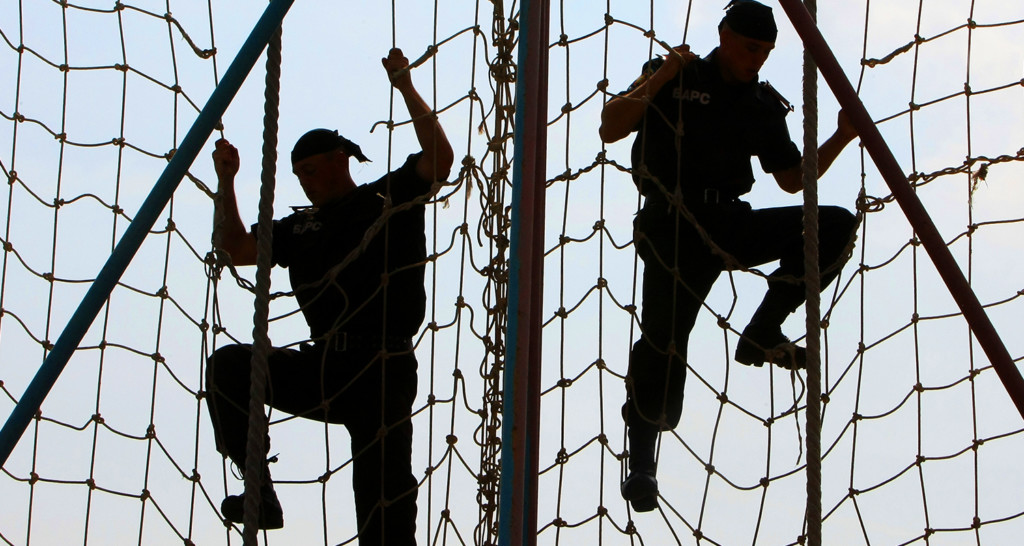
- Soldiers have to deal with extraordinary stress on a regular basis. Military psychologists have developed several kinds of training to help soldiers learn to perform at their best. You can use these skills in your own life.
- Habitually stressing yourself and testing your limits teaches you to perform well and keep going, even when you’re well beyond your comfort zone. Find out how to do these stress management techniques.
- Stress Inoculation Training teaches you the psychological tools to face stressors and adapt to them instead of being overwhelmed by them.
Imagine floating in the frigid ocean at 4 AM. You’re on the verge of hypothermia. You haven’t slept in a day. Your body is falling apart from hours of brutal physical training. Salt water bites at your blistered hands and feet. You don’t know what comes next, or when you’ll be able to rest. And your mind is constantly tempting you with the knowledge that you can give up anytime and make it all stop.
That’s the reality of a Navy SEAL recruit going through training. Trainees have to face a series of challenges designed to put them under severe physical and psychological stress — and teach them how to endure anything and still perform at a high level.
In a recent Bulletproof Radio [iTunes] podcast episode, Andrew Herr, a Department of Defense biotechnologist, talked about the military’s emerging interest in biohacking, and how they use psychology and physical challenges to make their soldiers more resilient to stress.
Soldiers have to perform and make reasoned decisions under extreme pressure; falling short can mean their death, or the death of those around them. To deal with that level of pressure, soldiers — particularly special forces units — undergo stress inoculation training designed to make them as resilient as possible.
The stress management techniques that soldiers use can be just as valuable in civilian life. Here’s a look at how soldiers learn to manage stress and keep performing, and how you can use the same techniques to become a more resilient person, no matter what life throws at you.
Get to know your limits (and push past them)
Navy SEAL training is some of the toughest in the world. It teaches soldiers extreme stress management techniques designed to push them past their breaking points, both physically and mentally. Highlights include:
- Holding a 200-lb. log with several other trainees, while doing intense cardio, for multiple hours. If one person drops the log, the entire team has to start over.
- Drown-proofing, where trainees get thrown into a pool with their hands and feet tied and have to stay calm enough to avoid drowning. People often pass out underwater while doing this drill and have to be rescued.
- The infamous Navy SEAL “Hell Week”. Trainees are chronically sleep-deprived and exercise around the clock, often in water so cold that they risk hypothermia. They also have to deal with the constant pain of salty ocean water and sand on cuts and chafing skin. Trainees eat around 7,000 calories a day and often still lose several pounds over the course of Hell Week.
This kind of training is extraordinarily stressful, which is the point. It forces trainees to confront what they think are their limits and push past them on a regular basis. Trainees have to be tough, but they also have to function at their best under extreme stress. Drown-proofing, for example, forces trainees to stay calm and act with precision, even when they have no oxygen and are seconds away from passing out underwater.
Resilience comes from overcoming stress on a regular basis. If you want to become more resilient to stress, add stress to your life in a controlled way, and get in the habit of performing well at your edge. It’s one of the most powerful stress management techniques out there. You don’t have to go as crazy as Navy SEALs do, of course. Here are a few ways to test your mental and physical limits:
- Do high-intensity interval training (HIIT) once or twice a week. If you’re doing it right, HIIT will push you to absolute physical exhaustion in under ten minutes. Do it regularly, and make it incrementally more difficult every week by adding more weight, adding more rounds, or decreasing rest time. You should end every HIIT workout feeling like you’re about to pass out.
- Take a cold shower every morning. Life coach Tony Robbins is famous for his cold plunges. In his recent podcast episode on Bulletproof Radio, he explained why: “It’s teaching my brain that when I say go, we go. I don’t negotiate with myself.” Taking a cold shower in the morning will never be easy, which is what makes it so important. Choosing cold exposure means ignoring that tempting voice in the back of your head telling you to take it easy or give up. Ignoring your inner doubter is a valuable habit to cultivate. Plus, cold exposure is amazing for your biology. And if cold showers feel tame after a while? Dump a couple bags of ice in a bathtub and sit in it as long as you can stand.
- Do a 24 or 48-hour fast. Intermittent fasting is great for you, and with Bulletproof Intermittent Fasting you use Brain Octane Oil to take away hunger, which makes fasting a lot easier to do and still gives you many of the benefits of full-on fasting. Every now and then, though, you may want to choose the hard road and have nothing but water for 24-48 hours. It’ll be a lot more challenging than doing Bulletproof Intermittent Fasting, which is the point in this case. You’ll have to learn to deal with hunger and fatigue and keep going.
Pushing your limits rewires your brain to handle stress
Pushing your limits is one of the most effective stress management techniques — it forces you to change the way your brain deals with pressure or challenges. Researchers have studied the psychological habits of resilient people and tested how changing your mindset can make you better at handling stress. Through their research, they’ve developed Stress Inoculation Training (SIT), which teaches people to become aware of their stress and learn how to handle it. Psychiatrists also use SIT to help people deal with psychological trauma and post-traumatic stress disorder (PTSD).
According to research on stress inoculation, there are certain fundamental habits that build mental resilience. Here are three of the biggest ones:
- Don’t be a victim. Watch out for self-pitying thoughts. Notice when you act or feel like a victim, and consciously choose to shift your mindset from “victim” to “survivor” or even “thriver.” People who reframe hardship as something to overcome, instead of something that’s happening to them, are significantly better at dealing with and recovering from stress, making this one of the best stress management techniques. One tip: look for the silver lining in the challenge. How will facing it and overcoming it make you a stronger person?
- Practice forgiveness and compassion. The most resilient people learn to accept difficult situations and find compassion for others and themselves. Being compassionate with yourself instead of beating yourself up allows you to handle more stress and decreases your stress response on a physiological level. Forgiveness and compassion also permanently change your brain, which is why they are central parts of 40 Years of Zen. When you notice the temptation to judge or blame others, consciously choose to be compassionate instead. It’ll be difficult at first, but stick with it. Every time you do, you’re lighting up and strengthening a new, positive pathway in your brain and breaking down old habits of negative thinking.
- Adaptively face your fears. Negative emotions like sadness, guilt, grief, shame, and anger are normal, and are not inherently bad for you. It’s not negative emotions themselves, but trying to avoid them, that undermines your ability to handle stress. When painful emotions come up, your monkey mind immediately wants to run from them. Notice when that happens, and feel the painful emotion instead of trying to avoid it. Nobody is happy all the time, and that’s okay. Get in the habit of feeling your negative emotions instead of trying to bury them. You’ll let them go much more quickly, and bounce back with a strong, resilient mindset.
Life is stressful, and it’s worth your time to learn and regularly practice stress management techniques that make you stronger. You’re also capable of a lot more than you think. Make it a habit to push your limits, and pay attention to how you react. When you practice these stress management techniques, you can learn to become more resilient than you thought possible.












